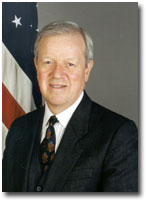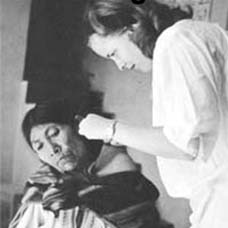
Former US Ambassador to Thailand Darryl Johnson (RPCV Thailand) and his wife Kathleen share memories
Former US Ambassador to Thailand Darryl Johnson and his wife Kathleen share memories
WIPAWEE OTAGANONDA
Former US Ambassador Darryl Johnson recently finished his three-year term in Thailand. He said his last posting was a ``fitting conclusion'' to his foreign service career, which started with him being a Peace Corp volunteer in Thailand. His work here is carried on by the new Ambassador Ralph L Boyce.
Johnson characterised his term as ``a period of gradual but consistent improvement in US-Thai relations, not dramatic, but important''. His tour of duty saw Her Majesty the Queen's visit to the US in 2002, the Prime Minister's visits to the US in 2001 and 2003 and the US president's visit here in 2003.
While in Thailand, his wife Kathleen, an avid weaver and textile collector, started the Thai Textile Society for like-minded people to get together to promote the appreciation and the preservation of Asian textiles, especially those of Southeast Asia. The couple is interviewed here.
In your swearing-in ceremony in December 2001, you said that to you this post was like ``winning the lottery''. Do you still feel that way?
Johnson: Oh I definitely, definitely feel that way. We both feel that way. We feel that having this assignment was the culmination of our foreign affairs experience. We have had lots of experience elsewhere in the world, and, in my case I would say every assignment has been a good assignment. I've never had a bad assignment, but this is the climax, a fitting conclusion, a place that I have always wanted to come to as Chief of Mission since the time I was here in the Peace Corps 42 years ago.
What was the high point of your term, your fondest memory?
Johnson: In terms of personal experiences, I think the Apec meeting _ the President's visit _ the glorious show of the Royal Barges on the river that night with the lights on the Grand Palace on the other side of the river. That was a once-in-a-lifetime experience.
We were invited to attend an evening at the Klai Kangwon palace in Hua Hin with the North Texas University Jazz Band. The university presented His Majesty the King with an honorary degree in jazz composition and performance. This is the university that has the first degree programme in jazz in the US. It brought its number one band of about 30 young people to play with His Majesty the King. I used to play the trumpet when I was much younger, so they invited me to come along and play with the band and with His Majesty. That was definitely a high point.
Any low points? Things you regret not having done?
Johnson: Oh yes, there's a lot of things we wished to do that we haven't done, among which was to visit parts of the country that we didn't have time to.
During your past 40 years, you must have witnessed many changes to Thai rural and urban society. Would you share with us the changes as seen through your eyes and what you think should be done?
Johnson: I think the changes have been so dramatic over 42 years that it's difficult to compare then and now. But I think in terms of the quality of life, the overall standard of living, the expectations that people have are certainly much higher than when I lived here 40 years ago. The country at that time was mostly rural. Now it's 50-50, maybe slightly more urban than rural. Bangkok has become one of the world's great cities. In those days it was just a series of four or five centres, which were not brought together. The Dusit Thani hotel was the biggest building when I left.
The Thai-US relationship is actually quite different also. In those days, while it was very positive, it focused much more on the conflict in Indochina. There was much more focus on what was happening in Laos and Vietnam and Cambodia and of course there was a time when the concerns about insurgency, communist insurgency, in Thailand was quite strong as well.
Now those days are all past and Thailand has friendly relations with those neighbours and in fact is kind of a model to those countries in terms of the potential development of the region. Thailand is a success story. I know that many people here think that Thailand is a small country far away from the centres of the world. In fact, Thailand is right in the centre of growing Asia, a growing Asean, and is a model to its neighbours.
When you leave Thailand, what memories will stay with you?
Johnson: That's a good question. It's about what impressions will we take with us when we leave and what will we think of when we think about Thailand.
There are so many images and there are so many experiences, it's hard to say which one would come first. I think maybe two, for me. One is the river; riding on the river in a small long-tailed boat and watching life on both sides of the river, visiting the Royal Barge Museum, going in the back klongs in Thon Buri and so forth. The second, I think, would go back to my early days here in the school and it would be the school itself, the students, the fellow teachers and the other people who were associated with the school, because we've had an opportunity to meet them, many of my former students and former teaching colleagues during this assignment and it reinforces that experience from the past, which I remember very fondly.
Mrs Johnson: I would think of my textile experiences, especially the ladies from the village in Surin who came to say goodbye to me. I feel a real bond to Thai people and with other people I've met. The Textile Society I've started. It's all part of my effort to help preserve and expand Thai culture and its relation to the rest of the world.
Is it tough being a diplomat's wife? For the spouse, you settle down here and suddenly you have to move to a new community again.
Mrs Johnson: It's a wrench to leave. You know, because you come to a place, not knowing a soul, not having a job. I don't speak the language, even though I try. I can understand it a bit. But I can never speak it in company because I would embarrass myself and my family. But then I also have to learn how things are done in a new culture.
But all of those things have two sides. On one side it's a challenge and sometimes frustrating, but on the other hand it's very exciting, and it's why I love the lifestyle that I share with my husband. There's nothing we love better than learning a new culture, how it works, meeting new people, understanding how they work, what they think, how they feel, how they do things. So yes, it's hard but it's also very gratifying.
With your insights and experiences, what kind of developments are needed with Thai textiles and handicrafts within the Otop Project to let them successfully compete in the world market?
Mrs Johnson: Thai designers themselves need to go and spend time in the villages where these things are made and work with them on an equal creative footing. They both need to participate in the creative process. It's not something you can do sitting in an office and saying ``Okay, I order you to do 25 of these.'' To make something really beautiful and something that will appeal to the world market you really have to work hard, it has to be well-designed and has to be designed with someone who is also market-smart. There has to be consistent quality control, and the producers have to be given management skills. They need to be able to control their own little businesses. It's not charity, it's business. And until you get those things cleared up, then it won't fly.
Society is becoming more dangerous _ how do you see this trend affecting how you raise children and as grandparents, what ideas do you think are most essential to instil in children?
Johnson: The first part of the answer, I would say, is that while today's world does have a lot of turmoil and a lot of challenges, the same was true 20 years ago, or 40 years ago, or 60 years ago. Every generation had its own kinds of challenges and growing up has never been easy.
The second part is that parents and grandparents certainly have a very direct responsibility in helping their children to understand the world and to develop the kind of confidence and skills that are necessary for them to be able to manage successfully in the world. And that includes, of course, a lot of loving attention to the children, especially at an early age. A lot of guidance and support as the children go through the school experience and a lot of encouragement as they complete that process and go out into the world on their own. There's no single formula, I think. But Thai society is a strong society, in terms of the identity of the people, in terms of the mutual support and in terms of the kind of self-confidence that allows people to be friendly and outgoing and to feel comfortable with their place in the world. So I'm not alarmed about the future in this country, and I'm not alarmed about the future in our country. I think there are certainly serious concerns but there always have been, and it's up to us, as parents and grandparents, to try to help the next generation to overcome them.
We have two grandchildren, as I think you know. My daughter, who was born in Chiang Mai, has two children, and they have been here to visit us twice and we will see them again in Washington when we arrive there just after Christmas. Our granddaughter is six years old and our grandson is four.
We are also very honoured to have had a chance to live in this house [where the interview was conducted]. It's not our house, or course, it belongs to His Majesty the King, but the US Ambassador has lived here now for 50-plus years, and it's a wonderful old house and we're really especially privileged to live in the middle of the city in this beautiful park.
We'll be sorry to leave but we're happy we had the opportunity.
Mrs Johnson: We leave with a full heart.










